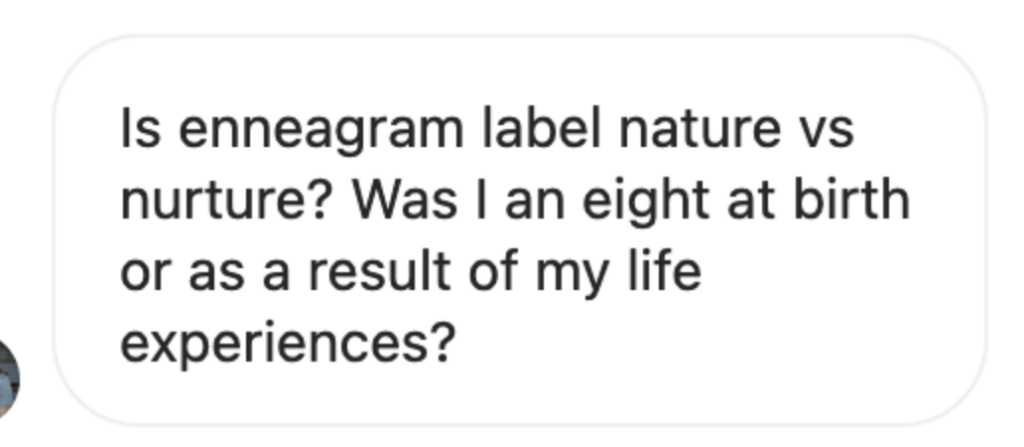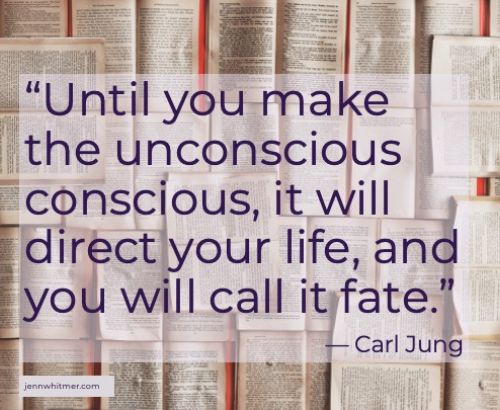This message landed in my IG inbox, and I thought the whole class might like to hear the answer.

Before I answer the nature versus nurture question, a short story:
I remember sitting on the concrete stoop of my little white house with green shutters waiting for my dad. My mom was an OB nurse working a 7-7 shift, and my dad was a city inspector. Normally, Dad was home just after the bus dropped me off. But this day, he wasn’t. I rummaged through my Holly Hobby lunchbox for any leftovers. I squinted at the fluffy but darkening clouds and wondered if I would be stuck in the rain.
I thought, “I guess I have to solve my own problem.”
So I went next door to my lovely elderly neighbor and pushed the doorbell. Gladys opened the door in her orange and brown house coat and welcomed me in. She offered soggy graham crackers and Tang and asked me about my day at school.
When my dad showed up 15 minutes later, it was just starting to sprinkle, and his eyes were wide and his face redder than his usual olive tan.
“Jennifer, I couldn’t find you! Where were you? Why didn’t you wait on the stoop?”
With all the practicality of a child, I declared through a mouthful of crackers, “You were late. I didn’t want to get wet.”
This experience wasn’t traumatic, but it is one of the first times I can clearly remember thinking, “I have to depend on myself.” I was 5. (Don’t judge my parents. It was 1981.) You have an experience like this in your childhood that shows up in your Enneagram personality.
Quick personality theory background: Your personality is part of your character that develops in childhood so you can make sense of the outside world. It’s like a colored pair of glasses you unconsciously filter everything through so you can stay safe.
Practically, that looks like a message or a story you believe is true. And each Enneagram personality type has a sensitivity to its unique message. And while your brain thinks it’s keeping you safe, it’s also keeping you stuck in unhealthy patterns.
So the nature vs. nurture question: It’s both.
Nature: Like temperament, you are born with a sensitivity to your unconscious Enneagram message.
Nurture: Your childhood experience can intensify that message and make those glasses you look through more opaque. You have a more rigid personality structure and a thicker filter when the unconscious message is consistently reinforced. (Quick note for parents: you could be the best parent possible, and your kids are wired to pick an unconscious message. Compassion and grace for yourself!)
If you’ve been around a minute, you know I love this truth from Carl Jung:
“Until you make the unconscious conscious it will direct your life and you will call it fate.”
The Enneagram helps you see that unconscious message.

Unconscious Childhood Messages by Enneagram Type:
Type Eight: It’s not ok to be vulnerable or let your guard down.
Type Nine: It’s not ok to assert yourself or necessary to be involved.
Type One: It’s not ok to make mistakes, and you have to fix everything.
Type Two: It’s not ok to have your own needs or desires.
Type Three: It’s not ok to have your own feelings and identity, and your accomplishments are your worth.
Type Four: It’s not ok to be too much, too happy, or not enough.
Type Five: It’s not ok to be too comfortable in the world, and your presence is an issue.
Type Six: It’s not ok to trust yourself or to be too sure of yourself.
Type Seven: It’s not ok to depend on anyone for anything.

Just start to notice when this comes up for you. You don’t have to revisit traumatic childhood memories to notice this message (but by all means find a great therapist to find healing!)
One article can help you start noticing, but freedom and flourishing are a bit more. 😀
In the Catalyst Leadership Lab, my coaching program, we working on the skills to respond to your unconscious message so you move from calling it fate to flourishing in your life.
I have spots for 8 women leaders in Catalyst Leadership Lab. Are you interested? You can comment below, and I’ll send you more info!

COMMENTs:
0